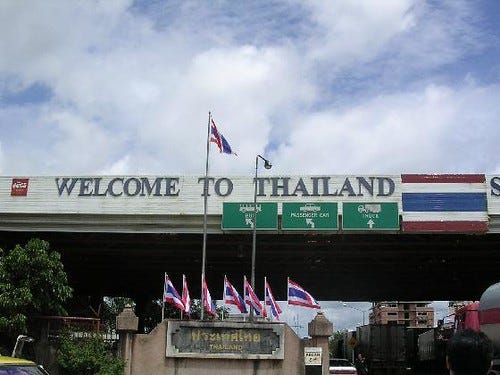Expect Dannok, just across the border from Bukit Kayu Hitam in Kedah to be one of the prime locations.
The gateway to the closest legal casino to Malaysia. There are already a couple of underground casinos operating in Dannok at present.
Thailand is edging closer to legalising large-scale entertainment complexes that include casinos, according to Deputy Finance Minister Julapun Amornvivat. The final draft of the bill paving the way for these developments is slated for Cabinet review within the next three to four weeks.
Julapun disclosed that 16 government agencies have contributed their insights on the proposed regulation, which will accompany the final draft. This bill, initially drafted by a dedicated House committee, is expected to undergo refinements based on the feedback received.
“The casinos will occupy no more than 5% of the space within these complexes, which will also feature hotels and various entertainment facilities,” Julapun explained. The project is seen as a major economic boost, with potential investments estimated between 30 billion and 50 billion baht.
Despite the economic advantages, several agencies have called for measures to mitigate the social impact of gambling. Proposed mechanisms aim to shield society from potential negative effects, ensuring responsible operation.
After Cabinet approval, the bill will head to the Office of the Council of State for legal vetting before being presented to the House of Representatives. Additionally, a national committee comprising representatives from different agencies will be formed to oversee the project.
Prime Minister Srettha Thavisin has thrown his support behind legalising casinos, arguing that it would allow for better control of gambling and proper tax collection. Currently, Thailand's strict 1935 Gambling Act only permits state lotteries and government-backed horse races. Unregulated online gambling, though not explicitly covered by law, is also rampant.
The government’s push for legal casinos is partly aimed at curbing illegal gambling activities, with hopes of raising substantial public funds through regulation and taxation. There are discussions to restrict access to foreigners, akin to Macau’s model in China, the only place where gambling is legally sanctioned.
A recent government report suggests that while licenses would be issued for these complexes, operators would need to secure their own funding. The complexes are expected to be situated near major tourist areas, within 100 kilometres of an airport, but not near Phuket. The initiative could generate up to 50,000 jobs, with each complex employing around 10,000 people.
Though any new gambling laws will take time to implement, the proposal already enjoys significant backing from business leaders and has strong support from the Prime Minister.
This is a great decision for corporate interests, but if Thais are not restricted from entering, there will be major social consequences. This issue could be a barrier to finalising any laws and rules of operation. Expect citizen groups to strongly oppose such a move.
Subscribe Below:





Ever the more reason we should tweak the Religion of Peace to accommodate gambling. After all, we've done a great walk around the holy scriptures inventing the scam called "Islamic banking".
We'll be in permanent poverty if we do not split the difference in the lucrative earnings from gambling with the Thais, you don't want them to make all the money.
Gambling will bring in the big gamblers - and their money. More than often these are unbelievable eye-watering sums. That's why the casinos offer free rooms, free food, and, in case you are not aware, free prostitutes for these punters.
I think casinos should be along the East Coast to open up the areas for all development. I think our conservative mullahs will be amenable once they see real big-time moolah and those super high-end luxury cars, Alhamdullilah!